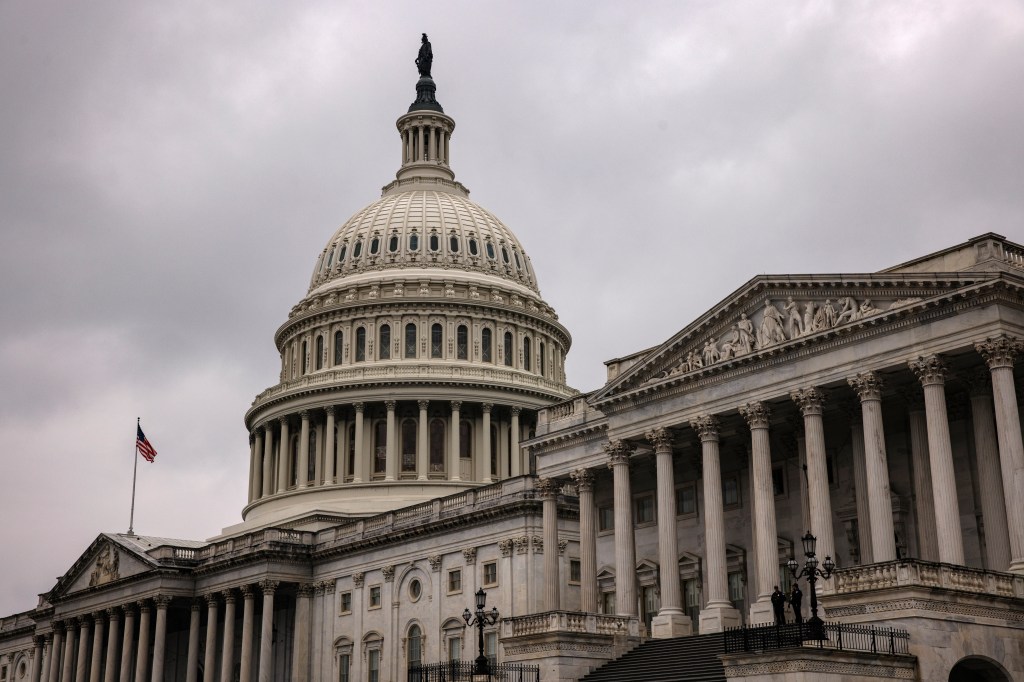House passes $467.5B ‘minibus’ spending bill to avert partial shutdown
The House of Representatives approved a “minibus” spending bill in a 339-85 vote on Wednesday to avert a partial government shutdown this weekend — despite opposition from conservative Republicans.
The $467.5 billion package was supported by 207 Democrats and 132 Republicans and keeps funding levels roughly the same through Sept. 30 for the Departments of Veterans Affairs, Agriculture, Transportation, Commerce, Housing and Urban Development and Justice, as well as military construction.
Senate and House appropriators released the 1,050-page bill on Sunday afternoon, with Republicans celebrating the domestic spending levels as a budget cut for federal agencies like the FBI and Democrats touting the protection of food and housing programs.
Funding for the Departments of Defense and Health and Human Services, among others, will run out on March 22 at midnight if another spending bill isn’t passed by then.
In January, House Speaker Mike Johnson (R-La.) negotiated with Senate Majority Leader Chuck Schumer (D-NY) a topline of $1.66 trillion in federal spending for fiscal year 2024, after having split the massive package into two separate bills last year.
Faced with opposition from the conservative House Freedom Caucus and others, Johnson was forced to bring the Wednesday government funding bill to the floor under a rule that required two-thirds of the House to vote for it.
Rep. Bob Good (R-Va.), the leader of that caucus, and 82 other Republicans later voted against it.
“MEGABUS #1 is a massive spending bill with more than 6,000 earmarks,” he said Wednesday on X, referring to the practice of setting aside spending specifically for projects in lawmakers’ districts. “We should not be giving $12.7 billion to Congressional pork projects when we are $34 trillion in debt.”
Conservative Senate Republicans have said they will also oppose the package over the earmarks, with Sen. Mike Lee (R-Utah) referring to it as the “Schumer minibus” and urging his House colleagues to pass a continuing resolution to fund the government at current levels.
As part of a deal struck during last May’s debt ceiling fight, a 1% government-wide cut on discretionary spending would go into effect on April 30 if Congress passes a continuing resolution past that date.
Johnson has cautioned that the two-vote House Republican majority is too slim to risk a fight that could lead to a government shutdown — or give their caucus leverage against the Democrat-controlled Senate and White House.
“We have to be realistic about what we’re able to achieve,” Johnson said of the measure, touting a 10% cut to the Environmental Protection Agency, a 7% cut to the Bureau of Alcohol, Tobacco, Firearms and Explosives and a 6% cut to the FBI.
Other conservative wins included banning the sale of oil from the US Strategic Petroleum Reserve to China and prohibiting the Justice Department from investigating parents who exercise their free speech rights at school board meetings.
But the Freedom Caucus urged its members to vote against the whole spending package anyway, saying in a statement that it awards “Democrats higher spending levels” and “punts on nearly every single Republican policy priority.”
House Democrats whipped their members to vote for the package, but a gun rights provision in the bill also frustrated Sen. Chris Murphy (D-Conn.) enough that he said he would oppose the whole thing.
“I have some bad news – buried in the appropriations bill being voted on this week is a terrible new gun policy rider that significantly rolls back the firearms background check system,” Murphy posted on X.
The rider prohibits the Department of Veterans Affairs from sharing the names of beneficiaries with the FBI’s National Instant Criminal Background Check System unless the veteran is considered a danger to himself or herself, per a judge’s order.
“I can’t sugarcoat this: this provision – which could result in 20,000 new seriously mentally ill individuals being able to buy guns each year – will be a death sentence for many,” Murphy added. “It’s unacceptable this provision was pushed by Republicans. Democrats shouldn’t have acquiesced.”
Rep. Maxwell Frost (D-Fla.), a staunch gun-control advocate, opposed the package for that reason. He was one of just two Democrats who voted against it.
Democrats warded off other Republican policy riders with the bill, including a provision to ban access to the abortion pill mifepristone, and won a $1 billion increase to the women, infants and children (WIC) food program for low-income applicants.
“The bill certainly doesn’t have everything that we may have wanted, but I am very proud to say we successfully defeated the vast majority of the extreme cuts and hundreds of harmful policy riders proposed by the House Republicans,” said House Appropriations Committee ranking member Rosa DeLauro (D-Conn.).
The Senate is expected to vote on the package before Friday’s midnight deadline.
With Post wires.















